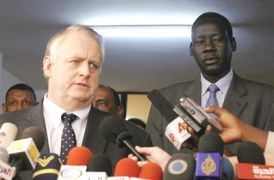Washington demands Darfur resolution before to normalize ties
February 25, 2008 (KHARTOUM) – Washington played down Sudanese optimism for quick normalization of bilateral ties between the two country asking once again to end Darfur conflict before.
 Following a meeting on Monday with the visiting news US envoy, Sudanese foreign minister said he expects to normalize relations with Washington within 4-6 months after more than a decade under U.S. sanctions.
Following a meeting on Monday with the visiting news US envoy, Sudanese foreign minister said he expects to normalize relations with Washington within 4-6 months after more than a decade under U.S. sanctions.
In Washington, however, the State Department said there was no proposed new timetable for normalizing ties.
Spokesman Tom Casey said Sudan must first help end violence in its Darfur region and cooperate with setting up a United Nations-African Union (UNAMID) peacekeeping force there.
The United States imposed economic sanctions on Sudan in 1997 and labeled it a “state sponsor of terrorism.” Although Washington has a large embassy in Khartoum, it does not have a full ambassadorial post.
Removing sanctions was tied first to ending a long running war in the south of Africa’s largest country, but after a north-south peace deal the separate conflict in Darfur brought a new U.S. focus on human rights and kept relations icy.
“The end game is normalization of relations between the two countries,” Foreign Minister Deng Alor told reporters after meeting Richard Williamson, who was making his first trip to Sudan since taking up his post.
“We have a timetable something between now and the coming four months … maximum six months.”
He said normalization could include restoring a U.S. ambassador in Sudan, lifting some or all the sanctions and removing Sudan from the list of sponsors of terrorism.
But neither he nor the U.S. envoy would be drawn on what specific conditions Sudan needed to meet to achieve this.
Williamson described the meeting as “businesslike and pragmatic,” adding that his job was to move towards peace in Darfur and cement the 2005 north-south deal known as the Comprehensive Peace Agreement (CPA).
“Progress cannot be just in lofty rhetoric but deliverable specifics on the ground where we can find common cause,” he said.
In Washington, Casey said U.S. policy on its relations with Sudan had not changed.
In order for there to be progress on bilateral relations, the United States expected that Sudan would cooperate fully with deployment of the UNAMID force “and that they also take the kind of concrete steps to halt violence by the Janjaweed (militias) and others in Darfur,” he said.
Casey said U.S. envoy Williamson was scheduled to go to Darfur and south Sudan later this week.
Williamson replaced Sudan veteran Andrew Natsios who resigned last year, a move diplomats said was out of frustration at the lack firm action from Washington on key issues like supporting the north-south deal.
Mostly non-Arab rebels took up arms in early 2003 accusing the central government of neglect. Khartoum mobilized mainly Arab militia to quell the revolt.
Information for this report provided by Reuters
